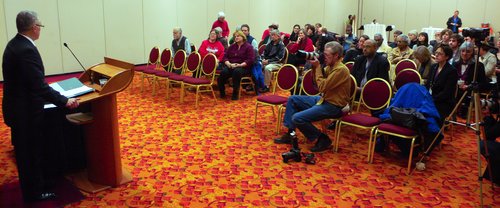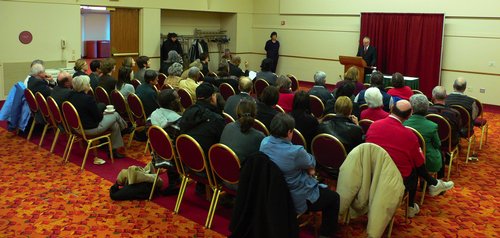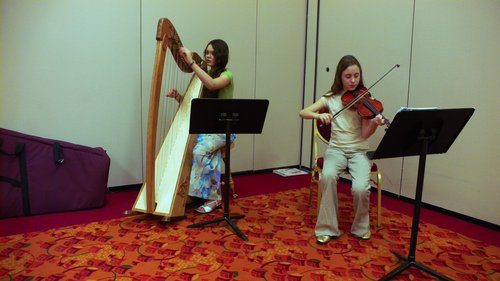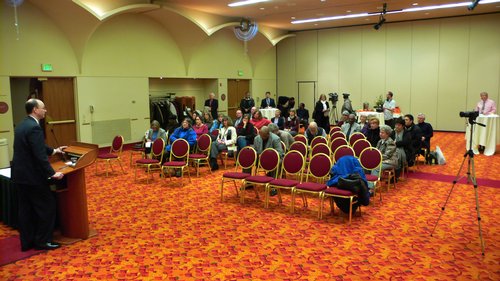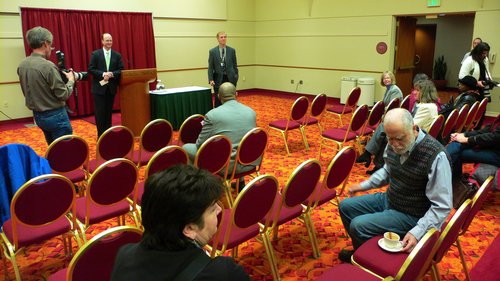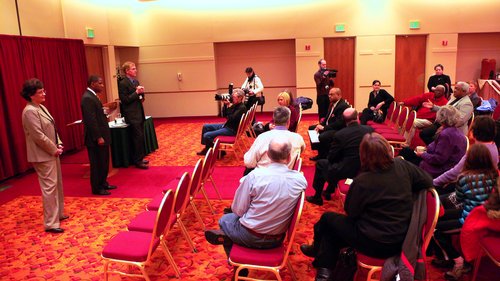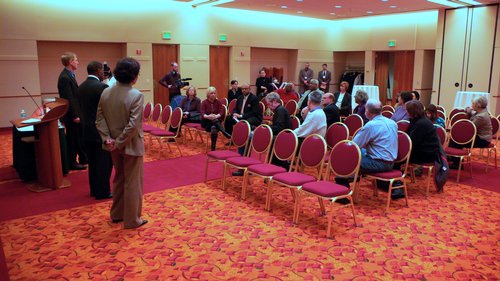The Board of Education of the Madison Metropolitan School District, after consulting staff, students, parents and community members, seeks an educational leader who is student-centered and demonstrates the following characteristics:
Possessing:
- Leadership experience and demonstrated success in a diverse community and school district
- Leadership experience and demonstrated success in challenging and engaging students at all points along the educational performance continuum
- Effective communication skills
- Strong collaborative and visionary leadership skills
- Unquestioned integrity
- Excellent organizational and fiscal management skills
Ability to:
- Deal directly and fairly with faculty, staff, students, parents and community members
- Be accessible, open-minded and consider all points of view before making decisions
- Build consensus and support for a shared vision for the future
- Develop positive working relationships with a wide variety of constituent groups
The individual selected is expected to be highly visible in and engaged with the schools and community. Successful experience as a superintendent or district level administrator in a similar urban environment and school district size is preferred.
Hazard, Young, Attea & Associates, Ltd. Executive Summary 960K PDF File:
This report summarizes the findings of the Leadership Profile Assessment conducted by Hazard, Young, Attea & Associates, Ltd. (HYA) for the Board of Education of Madison Metropolitan School District (MMSD). The data contained herein were obtained from reviewing approximately 185 completed Leadership Profile Assessment forms, 220 emailed responses and interviews with approximately 240 persons identified b y the Board, in either individual, focus group or community input settings, on September 19 and 20, 2007. The questionnaire, interviews and focus groups were structured to gather data to assist the Board in detennining the primary characteristics it might seek in its next superintendent of schools. Through this process, the consultants attempted to identify the personal and professional characteristics desired in the superintendent, as well as the skill sets necessary to maintain what constituent groups value and to address current and emerging issues which the District might be facing.
Information obtained through interviews, emails and completed questionnaires reflects similar views from all groups with respect to the multiple strengths of MMSD. Respondents were extremely proud of their District’s national recognition for educational excellence. They voiced pride in their students’ excellent test scores, the District’s exceedingly high number of National Merit Semifinalists and its ability to provide top quality academic programs in an environment of rapidly changing demographics. Given the changes in the socio-economic, racial and ethnic make-up of the student body, residents identified as major strengths the District’s commitment to reduce the achievement gap between Caucasian and minority students, its willingness to address issues of diversity and its provision of training in best practices to assist staff in meeting the special needs of a diverse student population.
Respondents also pointed to MMSD’ s commitment to neighborhood schools, retention of small class sizes in most elementary schools, rigorous curriculum, support of music programs and the arts, broad range of sports and other extra-curricular activities, high expectations of a well educated parent constituency and its excellent special education program with the focus on the inclusion of students in regular classrooms. Residents cited the strong support for the District by caring, involved parents and by a community that values high academic standards and achievement. Other strengths cited included the District’s bright, motivated students and its highly competent, dedicated, hard-working teachers and support staff committed to the success of all students. Building administrators were commended for their dedication, accessibility and innovative leadership in providing programs that reflect the needs of their individual school populations. All respondents cited MMSD’s proximity to and partnership with UW-Madison and Edgewood College as invaluable assets.
The over-arching challenge cited by all respondents centered on the MMSD’ s future ability to maintain its excellent academic programs and student performance, given the District’s insufficient financial resources, significant budget cuts and ever-growing low-income and ELL student populations. These concerns are interrelated and if not addressed successfully could eventually become the self-fulfilling cause of what respondents feared the most: the exodus of a considerable number of high-performing upper/middle class students to private or suburban schools as a “bright flight” mentality overrides parental desire to provide children with a “real world” enviromnent of socio-economic, ethnic and racial diversity.
Concern over the funding issue was expressed in several ways: failure to cut the personnel costs of a “top heavy” central office, more equitable funding of the various schools, state level politics that restrict local access to property taxes and fail to increase state funding, the cost of responding to the arbitrary mandates of t he NCLB law, the future need for a referendum to increase property taxes and a strong teachers’ union perceived as placing its salary/benefit issues, restrictions on management prerogatives and undue influence over the Board ahead of the District’s interests. The impact of continued budget cuts strikes at the quality and reputation of the educational program, with fear of an erosion of the comprehensive curriculum and after-school activities, reduction in aides who help classroom teachers with ELL and special education students; curtailment of music, fine arts and gifted programs; increases in class size; lack of classroom supplies; postponed maintenance and renovation of aging facilities; need to update technology and the lack of long-range financial planning as the District confronts one financial crisis after another.
Concern over the impact of the changing demographics was also expressed in various ways: fear that the rising cost of responding to the special needs of an increasingly diverse student population and efforts to close the achievement gap will reduce the dollars available to maintain electives and enrichment programs for regular and gifted students; the changing school culture in which gang activity, fights between students, a pervasive lack of respect by students toward authority are perceived as the norm, which in turn generates fear that the schools are no longer as safe as they used to be; the need to provide more relevant programs for the non-college bound students and the need to address the high minority student dropout rate. Concern that students from minority group populations are disproportionately disciplined, suspended and/or expelled was also expressed.
Almost all constituent groups felt that the Board and Administration need to gain the trust of parents and the community through communication that clearly identifies the fiscal issues and the criteria on which funding and budget decisions are based. Many expressed the view that the Board and Administration’s lack of transparency in district decision-making and show of disrespect toward those who question administrative proposals have eroded constituent support. A concerted effort by the Board and Administration to become more creative in publicizing the successes of MMSD’s outstanding educational opportunities might encourage mor e young upper/middle class families to move into the District and convince others to remain.
Respondents agreed on many of the attributes that would assist a new superintendent in addressing the issues confronting MMSD. They want a student-centered, collaborative educational leader of unquestioned integrity with superior communication, interpersonal and management skills. He/she should have strategic plmming skills and feel comfortable with the involvement of parents, teachers and community members in shaping a vision for the District’s future direction. The successful candidate should be a consensus builder who has had experience in meeting the needs of an ethnically and socio-economically diverse student population. He/she should b e sensitive and proactive in addressing diversity issues and a strong advocate of effective programs for ELL and gifted students and of inclusion programs for special education students. The new superintendent should be open to new ideas and encourage staff to take risks with research-based initiatives that engage students in learning and maintain high academic expectations as they work together toward common goals. When confronted with controversial issues, he/she should be willing to seek the views of those affected, examine all options and then make the tough decisions. The new superintendent should have the courage of his/her convictions and support decisions based on what is best for all students
The successful individual should have a firm understanding of fiscal management and budgets, K-12 curriculum and best practice and the importance of technology in the classroom. He/she should be a strong supporter of music, fine arts and after-school activities. The new superintendent should have successful experience dealing collaboratively with a Board and establishing agreement on their respective govemance roles. He/she should have a proven record of recruiting minority staff and hiring competent people who are empowered to strive for excellence and are held accountable.
He/she should b e visible in the school buildings and at school events, enjoy interacting with students and staff, be actively involved in the community and seek opportunities to develop positive working relationships with state and local officials, business and community groups. The individual should be a personable, accessible, open-minded leader who engages staff, students, parents and the community in dialogue, keeps them well informed and responds respectfully to inquiries in a timely, forthright manner.
While it is unlikely tofind a candidate who possesses all of the characteristics desired by respondents, HYA and the Board intend to meet the challenge of finding an individual who possesses many of the skills and character traits required to address the issues described b y the constituent groups. We expect the new superintendent to provide the leadership that inspires trust and unites the community in its support for MMSD’s efforts to achieve an even higher level of performance for its students and staff.
Respectfully submitted,
Marvin Edwards
Jim Rickabaugh
Joan Levy
960K Executive Summary.


